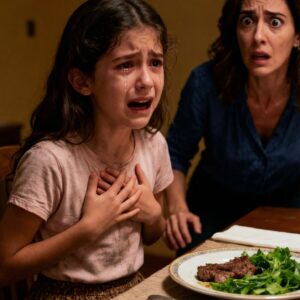When my mother-in-law insisted on having my kids for an entire week during their holiday break, I didn’t think much of it. I figured it would be harmless—just some “grandma bonding time” and maybe a small breather for me. What I never expected was the gut-punch revelation waiting for me when I went to pick them up. It changed everything I thought I understood about her.

I’m Abby, 34, married to my husband Brad for seven years. We have two children: Lucas, 8, and Sophie, 6. My mother-in-law, Jean, is in her late sixties. Our relationship has always been what I’d call polite—cordial smiles, surface-level small talk, the occasional dinner invitation.
But Jean has always been… intense. There’s this forceful energy about her, like she’s constantly trying to prove she’s the ideal grandmother. And sometimes that intensity comes out as controlling.
“She’s just old-fashioned,” Brad would say whenever I expressed concern. “She means well.”
I tried to believe him. For years, I brushed off the little red flags—the way she always called Lucas “her boy,” or how she scolded Sophie for eating with her hands, snapping, “Not under my roof, young lady!”
Then, last month, Jean called me sounding unusually cheerful. “Abby, how would you feel about me taking Lucas and Sophie for a whole week during their holiday break?” she asked. My stomach flipped a little.
“A week?” I repeated, startled.
“Yes! I’d love to have them all to myself—just spoil them rotten. You and Brad could use the time, couldn’t you? A little break?”
I looked over at Brad. He gave me an enthusiastic thumbs up. “They’ll have fun,” he said.
So, I agreed—hesitantly.
Jean practically squealed. “Oh, don’t you worry about a thing, dear. They’ll be in good hands.”
Before dropping them off, I handed her an envelope with $1,000.
“Jean,” I said, giving it to her, “this is just so you won’t have to dip into your savings for food or anything they might need this week.”
She looked surprised at first, then smiled warmly. “Oh, Abby, that’s so thoughtful of you! Don’t worry—I’ll put it to good use. These kids are going to have the best week ever.”
The week crawled by. I thought I’d enjoy the quiet, but instead I kept reaching for my phone, wanting to call Lucas and Sophie more often than I should have.
When pickup day finally came, I could hardly sit still. I was bursting to see them, to hear about their week. But as I pulled up to Jean’s house, a strange uneasiness washed over me.
The house looked normal, but something felt off. Maybe it was the way Jean opened the door.
“Abby! You’re here!” she said with a smile—but her eyes didn’t match it.
“Hi, Jean! How were they?” I asked as I stepped inside.
“Oh, wonderful,” she answered, though her voice wavered just a bit. She was acting overly cheerful, too composed, almost rehearsed.
I glanced around. Normally, I’d hear toys clattering, kids laughing, running around. Instead, the house was silent. Completely silent.
“Where are the kids?” I asked, scanning the living room. Any other time, Lucas and Sophie would be sprinting toward me, arms wide.
Jean kept smiling, her hands clasped tightly. “Oh, they’re inside,” she said with a breezy wave. “They’ve been so busy today—lots of work.”
I blinked. “Work? What kind of work?”
She laughed nervously and waved me off. “Oh, just little things. Helping out their grandma. You know how kids are—always eager to lend a hand!”
But her tone was wrong. Too sweet. Too dismissive. My instincts started screaming.
“Where exactly are they, Jean?” I asked, my voice firm.
Her eyes flicked down the hallway and then back at me. “In the backyard,” she finally said. “They’ve been helping me with the garden. They’re such little troopers!”
I didn’t waste another second.
Following faint voices to the sliding door, I stepped outside. The cool air hit me—but it didn’t stop the wave of dread.
“Lucas? Sophie?” I called.
Then I saw them. And my heart sank.

They were standing there, faces smeared with dirt, eyes exhausted but lighting up the moment they saw me. Lucas’s clothes were worn, stained, and unfamiliar. Sophie’s shirt was torn at the shoulder. None of it was what I had packed.
“Mom!” Lucas cried, throwing himself into my arms. Sophie followed, trembling, pressing her face into my side.
“What is going on?” I demanded, turning to Jean, anger shaking my voice. “Why are they out here like this? They were supposed to be having fun—not working!”
Lucas looked up at me, voice unsteady. “Grandma said we had to help. She told us if we worked hard, we’d go to the park… but we never went, Mom.”
Sophie added softly, “She made us dig all day, Mommy. I wanted to stop, but she said we had to finish first.”
Jean stood a short distance away, arms crossed defensively.
“Jean!” I shouted, my voice cracking. “You promised you’d spoil them this week—not turn them into laborers! What is this?”
Jean flushed and shifted. “Oh, don’t exaggerate, Abby,” she said dismissively. “They were eager to help. And why not? A little hard work never hurt anyone. They’ve learned valuable lessons about responsibility and discipline.”
“Responsibility? Discipline?” My voice trembled with anger. “They’re children, Jean! They’re supposed to play and laugh—not break their backs in your garden! How could you think any of this was okay?”
She rolled her eyes. “They need to learn life isn’t all fun and games. You’re raising them spoiled, Abby. I was just trying to help!”
I inhaled deeply, trying to keep my control—at least in front of my kids.
“Jean,” I said carefully, “where is the $1,000 I gave you for groceries and activities?”
Her gaze shifted downward. “Oh, I didn’t need it for groceries,” she said casually. “The kids didn’t need all that food. And I thought… I thought I could use the money for… other things.”
My stomach dropped. “Other things? What does that mean?”
Her face reddened. “I… I didn’t use the money for the kids. I’ve been struggling with bills. I thought if they could help with the house and garden, I could save some money.”
For a moment, I had no words. The betrayal hit hard.
“So you used my children as free labor?” I finally said, voice trembling.
She flinched but didn’t deny it. “It wasn’t like that, Abby. I thought it would be good for them—teach them hard work.”
“Hard work?” I repeated sharply. “I gave you that money so they could have fun—make memories. Not… this.” I gestured toward the backyard, where Lucas and Sophie now sat on the porch looking pale and drained.
In that instant, everything clicked. Jean’s need for control. Her insistence she knew best. And now, using my kids to solve her problems under the guise of “helping.”
I knelt beside my children and wrapped my arms around them. “I’m so sorry, babies,” I whispered. “This isn’t what I wanted for you.”

Then I stood and turned to Jean, who stared at the ground, shame creeping across her face.
“Jean,” I said firmly, “we’re leaving. My kids deserve to be kids—not workers in your garden.”
Her lips trembled. “I… I thought I was doing the right thing.”
“No, Jean,” I said quietly. “You didn’t.”
Without another word, I picked up Sophie, took Lucas’s hand, and went inside to gather their things. We were done.
When we stepped outside, the crisp evening air felt almost cleansing after the stifling tension of her house. Lucas held my hand tightly. Sophie rested her head on my shoulder. Their silence was heavy, filled with exhaustion and relief.
“Please, Abby,” Jean called from the doorway, voice breaking. “Don’t be angry. They’ve learned so much. It was just… it was just a mistake.”
I stopped and turned back to her. She looked desperate, guilty. For a moment, I considered responding—but nothing I could say would undo what she’d done.
“No, Jean,” I said gently but firmly. “This wasn’t a mistake. This was a choice. A choice you made without thinking about what they needed. They’re children, not tools to fix your problems or props to prove a point.”
She opened her mouth, but I shook my head. “I trusted you. And you broke that trust—not just with me, but with them. I won’t let this happen again.”
Her face crumpled, but I couldn’t offer her comfort—not now. My kids came first.
As we walked to the car, Lucas finally spoke.
“Mom?”
“Yeah, sweetheart?” I answered.
“Are we ever coming back here?”
I squeezed his hand. “No, buddy. Not until Grandma learns how to treat you the way you deserve.”
Sophie stirred in my arms and whispered, “Good.”
I buckled them in, got into the driver’s seat, and pulled away—leaving behind the house, the garden, and a piece of trust I knew would never be restored.
Note: This story is a work of fiction inspired by real events. Names, characters, and details have been altered. Any resemblance is coincidental. The author and publisher disclaim accuracy, liability, and responsibility for interpretations or reliance. All images are for illustration purposes only.



